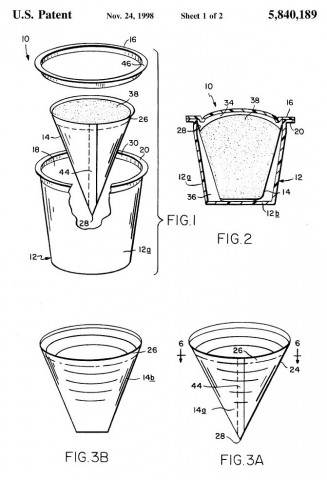So Keurig, amiright?
Green Mountain Coffee, the makers of those increasingly ubiquitous Keurig single-cup coffee machines, will be including digital rights management (DRM) in their next generation product (creatively called Keurig 2.0). This means that every time you pop a plastic pod into the machine, it will look for a tiny chip emitting a tiny radio signal that will let the coffee maker’s onboard computer know whether it is okay — with the company, not with you — to brew.
According to SlashGear, Green Mountain CEO Brian Kelley wants you to think of this as a customer-friendly feature:
To ensure the system delivers on the promise of excellent quality beverages produced simply and consistently every brew every time, we use interactive technology to help us perfectly brew all Keurig brew packs. Because of this, the system will not brew unlicensed packs.
But the SlashGear folks have a more honest assessment. The move, they write, is reminiscent of printer ink where printer manufacturers protect their right to overcharge consumers by including a chip in their cartridges that prevents unofficial refills from being installed.
And Boing Boing’s Cory Doctorow makes the logic of it even clearer:
I think Keurig might just be that stupid, greedy company. The reason they’re adding “DRM” to their coffee pods is that they don’t think that they make the obviously best product at the best price, but want to be able to force their customers to buy from them anyway.
Doctorow goes on to suggest that once the system is cracked — which it inevitably will be — this opens the door to the Keurig makers suing any company producing third party pods.
I would add to that that it also effectively closes the door on existing pods. If I understand this thing correctly, once Keurig users upgrade to the 2.0 machine, their old non-DRMed pods — whether produced by Green Mountain or not — immediately become obsolete. And in order to continue drinking from the Keurig fountain, they will be forced to jettison their existing collection and start over.

None of this, I will say, surprises me even a little bit. For me, the most distinctive feature of the Keurig machine has never been the coffee (though it is kind of vile), but the astonishing volume of waste that the thing produces as a byproduct of a household or office drinking just one or two cups per day per person.
What the Keurig-makers do is add an additional processing step to good old pre-ground coffee in which, rather than using a tablespoon to measure grounds into a standard drip machine, you use a difficult-to-recycle sealed piece of plastic to plug the grounds into their proprietary — but functionally equivalent — coffee maker. It is a great convenience, the Keurig folks tell us, to be able to throw away the pod as a whole rather than an old-fashioned biodegradable filter. And for that privilege, they lock customers into their system and charge them an arm and a leg for what amounts to stale coffee of an indeterminate age.
Consider that for a moment. And then consider whether it is out of character for Keurig to move to a system that creates yet more waste, and removes yet more choice from the hands of consumers, in order to increase its profit margins.
And as for their claim that this will help produce excellent beverages every time: I wouldn’t count on it. Anti-competitive practices are the last resort of companies that know they can’t compete on quality — or that would rather not have to.
If you want a great, low-waste single cup coffee maker, get a French press. Or, if you prefer filtered coffee, get an AeroPress
or a porcelain coffee cone
. You’ll be happier with the results in the end. And you won’t be supporting this — this, whatever it is.
I say fie to Keurig.